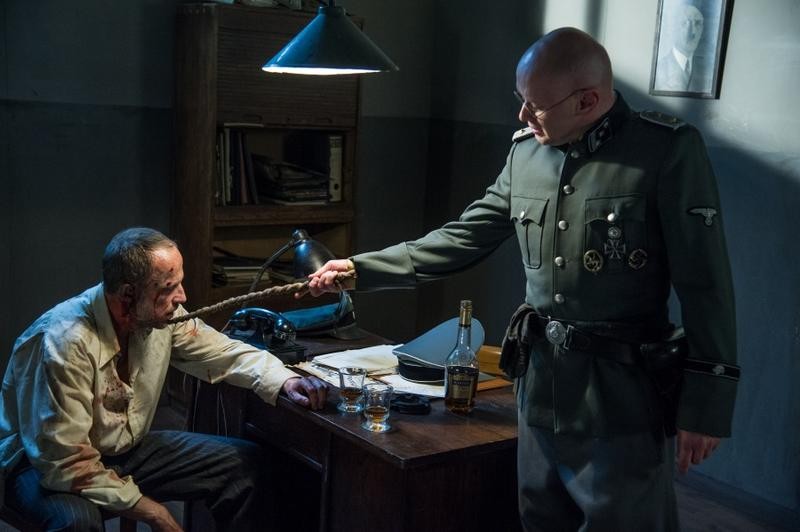 Reenactment of Karski's ordeal during the interrogation with a German officer: Łukasz Similat (Karski) and Wojciech Kalarus (German officer). (Photo: Wojciech Todorow)
Reenactment of Karski's ordeal during the interrogation with a German officer: Łukasz Similat (Karski) and Wojciech Kalarus (German officer). (Photo: Wojciech Todorow)
Karski’s Dilemmas Rhyme with the Modern Times
“I was a mailbox,” Karski candidly confesses about his role in his wartime missions in an interview which opens aPolish TV production, Karski that originally aired on Polish TV in December, 2014. It crowned the Karski Year, which was established to celebrate the 100th anniversary of Jan Karski’s birth, and has recently been acknowledged at the 15th Festival of Polish Radio Theater and Polish TV Theater “DWA TEATRY – Sopot 2015” by receiving numerous awards. Magdalena Łazarkiewicz, who directed and co-wrote the show, received an award for best director; Antoni Komasa-Łazarkiewicz for best music; Łukasz Simlat for the best male role (as Karski); Piotr Głowacki received an honorary mention for his role as Luk. Magdalena Łazarkiewicz also received an honorary Krzysztof Zaleski Award for the show, for “rejecting stereotypical and easy productions, and for presenting a show rooted in history and contemporary issues.”
Board members of the Jan Karski Educational Foundation and the team of its sister foundation in Warsaw, Fundacja Edukacyjna Jana Karskiego were heavily involved in pushing this initiative forward and in strong promotion of the show.
Karski is a multi-level production and combines a purely theatrical play with documentary theater. There is a contemporary part, which presents two young documentary makers, Luk and Olga, who are hastily trying to create a documentary about Karski. The historical part consists of the staging and filming of the most formative events from Karski’s life, which are to be used in the documentary. Then there is archival footage of the interviews with Karski and some horrifying scenes from the Warsaw Ghetto. On top of that, in the background, we get glimpses of footage of contemporary news coverage, such as the Ukrainian conflict. While Luk and Olga are struggling with the conceptual challenges of the documentary, they are questioning their personal values and priorities at the same time. As a result, the audience is witnessing the moral discourse about the choices Karski had to face and their significance for young people today.
“We want to show Karski through the sensitivities of the contemporary audience, and through the eyes of young people who, for different reasons, take up the production of a documentary about Karski,” said Magdalena Łazarkiewicz. “Gradually, this production starts to intertwine with their own life choices, and the dilemmas of the contemporary world start to dangerously rhyme with the reality of the old times.”
CREDITS
Directed by: Magdalena Łazarkiewicz
Written by: Magdalena Łazarkiewicz and Dominik W. Rettinger
Based upon an idea by: Marek Warnitzki
Top Cast: Łukasz Simlat (Jan Karski), Julia Kijowska (Olga) and Piotr Głowacki (Luk)
Cinematography: Wojciech Todorow
Stage Design: Katarzyna Sobańska
Costumes: Dorota Roqueplo
Music: Antoni Komasa-Łazarkiewicz
Historical Consultation: prof. Szymon Rudnicki
With special appearance by Maciej Wierzyński (playing himself), a renowned Polish journalist, author of a series of interviews he conducted with Jan Karski, “Emissary: In His Own Words.”
Produced by: Narodowy Instytut Audiowizualny, Telewizja Polska S.A.